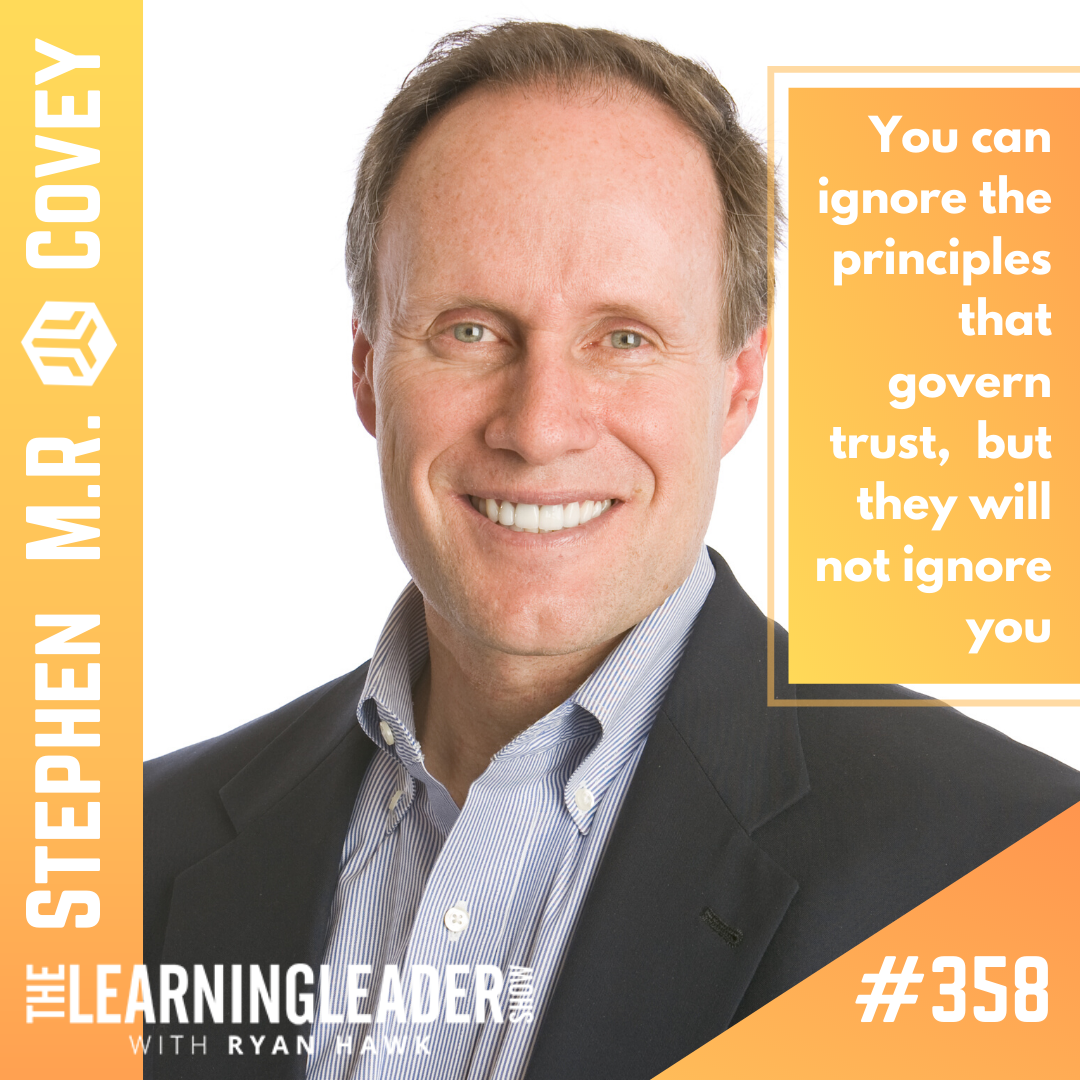Stephen M. R. Covey is a New York Times and #1 Wall Street Journal bestselling author of The SPEED of Trust—The One Thing That Changes Everything. He is the former CEO of Covey Leadership Center, which, under his stewardship, became the largest leadership development company in the world. Stephen personally led the strategy that propelled his father’s book, Dr. Stephen R. Covey’s The 7 Habits of Highly Effective People, to become one of the two most influential business books of the 20th Century, according to CEO Magazine. As President and CEO of Covey Leadership Center, Stephen nearly doubled revenues while increasing profits by 12 times. During that period, the company expanded throughout the world into over 40 countries, greatly increasing the value of the brand and enterprise. The company was valued at $2.4 million when Stephen was named CEO, and, within three years, he had grown shareholder value to $160 million in a merger he orchestrated with Franklin Quest to form FranklinCovey.
FORBES recently called, WELCOME TO MANAGEMENT, “the best leadership book of 2020.”
Be part of “Mindful Monday” — Text LEARNERS to 44222
Subscribe on iTunes or Stitcher Radio
The Learning Leader Show
- Sustaining excellence = They get results in a way that inspires trust. If you cut costs for profits, you won’t earn trust long term. You won’t win long term.
- “You must think… There always is a next time.”
- Build a culture of character and competence. Those are the components of trust.
- Taking shortcuts, cutting corners will get your short term results, but you will not sustain it. “Beware of the shortcuts.”
- Make expectations clear. Hitting the number is a commitment.
- For the mid-level manager: The middle is the key leverage point. You always need to be building trust and delivering results. Leaders go first.
- “Be trustworthy. Be trusting.” Give trust to others, lead with trust.
- If you have a bad boss? “Create an island of excellence in a sea of mediocrity.”
- “If we think the problem is everyone else, we disempower ourselves.” –> Look in the mirror: ‘Here’s what I can do…” Self trust. It starts inside of you.
- Neuroscience on trust – When there is low trust on a team, it saps the energy and joy. It’s not fun.
- High trust = energizing. How can I be that type of leader?
- For the person that doesn’t trust anyone else, they are really saying, “I don’t trust myself.” They know they lie.
- How to build trust with yourself?
- Learn to make and keep commitments with yourself and others.
- “Make, keep, repeat. Make, keep, repeat.”
- “Trust is doing what you say you’re going to do.”
- “Saying it builds hope. Doing it builds trust.”
- Learn to make and keep commitments with yourself and others.
- Trust = Character + Competence.
- Admiral McRaven – “If you want to change the world, start with making your bed.”
- “Private victories precede public victories.”
- Warren Buffett does deals based on trust. Trust impacts speed and cost. “Trust decrease transaction costs.” –> When you don’t have trust, there is a tax on that.
- When trust goes down, costs go up. When trust goes up, costs go down.
- Focus on your credibility. Your character and your competence. Build your reputation. Start with your behavior. Behave in a way to garner trust.
- Distrusts is exhausting. It’s not sustainable in relationships.
- How to handle a non-trusting boss?
- “You can’t change the conditions or change them. If you must stay, focus on YOUR credibility. The starting place is on increasing your credibility, it will create more clout, courage, and permission in your organization. Always start with yourself.”
- The Seven Habits Of Highly Effective People
- #1 – Be proactive. You’re responsible. “You’re not a program. You’re a programmer.” Between the stimulus and response, there is a space. I choose my response and take responsibility.”
- What’s it like having Covey as his last name – “The power is in the principles.”
- #5 – Seek first to understand, then to be understood. A doctor diagnoses before they prescribe. It builds trust when the other person feels understood.
- #7 – Sharpen the saw – Getting better. “The Learning Leader has never arrived…”
- #1 – Be proactive. You’re responsible. “You’re not a program. You’re a programmer.” Between the stimulus and response, there is a space. I choose my response and take responsibility.”
- His Dad’s ethos:
- To Live
- To Love
- To Learn
- To Leave a Legacy
- Here is WHY joining a Learning Leader Circle is a good idea…
Resources:
- Read: WELCOME TO MANAGEMENT
- Read: The Speed Of Trust
- Be part of “Mindful Monday” — Text LEARNERS to 44222
- Read: The Innovation Stack
- Connect with me on LinkedIn
- Join our Facebook Group: The Learning Leader Community
- To Follow Me on Twitter: @RyanHawk12
More Learning:
Episode 078: Kat Cole – From Hooters Waitress To President of Cinnabon
Episode 216: Jim Collins — How To Go From Good To Great
Episode #300: AJ & Keith Hawk – How To Instill Work Ethic & Curiosity In Your Children
Episode #357: General Stanley McChrystal – Leadership In Uncertain Times


Leave A Comment